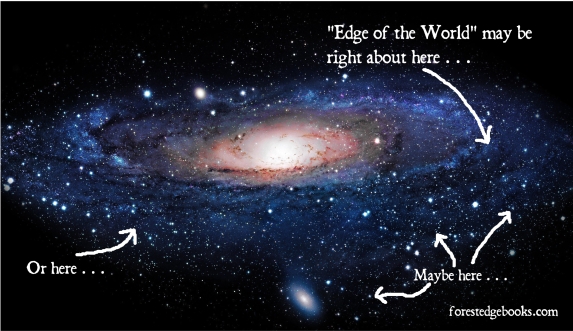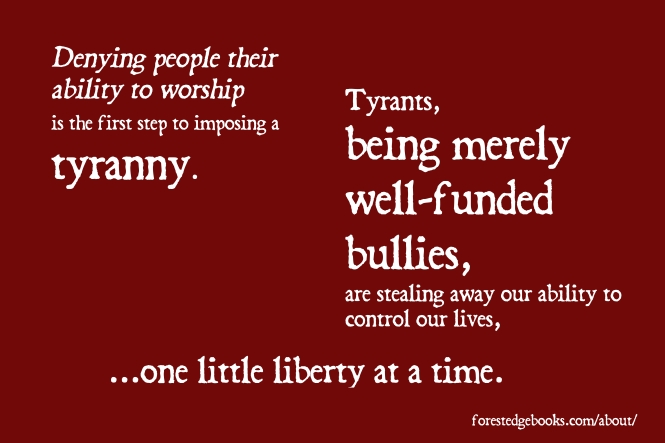The “Forest at the Edge” series, by Trish Mercer, explores what transpires when a government limits the knowledge and freedom of its citizens. The main characters are a school teacher, Mahrree Peto, who isn’t as discreet or compliant as she should be, and an army captain, Perrin Shin, who privately doubts the government because it clashes with his spiritual beliefs.
When these two get together, they think their quiet rebellion will go unnoticed since they’re at the remotest village called Edge of the World.
But the chairman of the government, Nicko Mal, doesn’t tolerate any dissent, no matter how subtle, so he takes a personal and vindictive interest in them.
(And now, for my rambling.)
Astronomers estimate there are 160 billion (yes, with a “b”) alien planets in the universe.
I assert that God created all of them, the entire universe, and that we’re not the only ones floating around in this massive existence knowing about our Creator. (See Hebrews 11:3 or Moses 1:33)
So what might life be like on just one of those 160 billion worlds? What might God’s Plan of Salvation look like on another planet?

(In the summer I look up into the night sky, slightly northeast from my position, and I’ve pinpointed a star which I think may be Edge’s sun. But please don’t ask me to map it.)
That idea, to explore how God’s gospel might be manifested in another part of the universe, drove me to write the Forest at the Edge series.
So far I haven’t found any genre which tackles this point of view, so I’ve struggled finding the correct niche for my books.
The books are “fantasy,” but there’s no magic or mythical creatures;
The books are “Christian,” but Christ isn’t overtly mentioned because He didn’t live on their planet;
The books are not, however, “sci-fi” because there’s no speculative science in them, although exploring life on another world seems to fit the bill.
See my problem?
I’ve always been intrigued by the notion of different cultures and different worlds. But I’ve always been disappointed that no sci-fi/fantasy world I’ve encountered ever has God. Yes, they have “god(s)” created by their culture, but I have to find a sci-fi/fantasy series which dares to touch the real God with a 10-foot-planet. (C. S. Lewis’s The Chronicles of Narnia is the only one I know of that comes close.)
What would a God-directed creation look like on another planet? How would He populate another world? What kinds of limits, terrain, people would be there? What would their belief systems look like?
I think they’d look a lot like ours.
I wholly trust that there is life on other planets, but aliens aren’t creepy blobs or elongated masses with telepathy. “Aliens” look just like us: human beings made in the image of our shared Father in Heaven. (Animals, however, may likely be very different than our earth’s, but I’m not creative enough to come up with those so I stole earth’s animals for my series).
I think our spiritual siblings on other worlds experience trials and tests, frustrations and fears, happiness and holiness quite the same as us. That’s because God’s plan of salvation is the same everywhere in the universe, because He is the same everywhere. As philosopher Pierre Teilhard de Chardin has famously said,
“We are not human beings having a spiritual experience. We are spiritual beings having a human experience.” (I would add, either on this world or one of millions others.)
At the heart of that human experience is the test of our wills. What do we want more: to follow God and His will for us, or to follow after our own impulses? And at the root of that is our ability to choose what we worship, how we live, and what we pursue.
But as I’ve been writing this series, something fascinating has happened: each year those choices become more restricted by those who would control us.
When I started drafting this series back in 2010 I couldn’t have comprehended how much American society would change. I’ve found problems I’ve written in my books occurring already, and frankly, it makes me quite concerned.
Much of the “Forest at the Edge” series pivots upon this declaration:
“Make your decisions as to what to embrace, but let me embrace my belief.” ~Perrin Shin, The Forest at the Edge of the World, Book 1
In 1836 a prophetic man wrote the following words: “We claim the privilege of worshiping Almighty God according to the dictates of our own conscience, and allow all men the same privilege: let them worship how, where, or what they may.” (emphasis added)
I fear that our freedom to “worship how, where, or what [we] may” is rapidly diminishing. Denying people their ability to worship is the first step to imposing a tyranny. Tyrants, being merely well-funded bullies, are stealing away our ability to control our lives one little liberty at a time.
I don’t like bullies. I had my share of them in grade school. Sometimes it’d be nice to retreat to the very edge of the world and hide from them.
But now’s not the time to run away.
Now’s the time to take a stand.
I only wished I were as brave as Mahrree who declares without reservation:
“I will defend the right for any one to question any thing. Each person has the right to find her own answers and believe as she wishes!”
~Mahrree Shin, Falcon in the Barn, Book 4
I’m warning you right now, the world truly is out to get you.

This work is licensed under a Creative Commons Attribution-NonCommercial-NoDerivs 3.0 United States License.


Doug, thanks so much! I love the observation you make about your kids, and how they’re so accepting of others. Just watch kids at a public playground involving everyone, then watch their parents, sitting separately. I wonder at what age this change occurs?
At least we as individuals and parents can try to keep that open acceptance and mutual celebration alive in our families, and maybe we can reverse this trend.
~Trish
LikeLike
Love your work Mrs Mercer.
It does seem a sign of the times doesn’t it, where intolerance seems to even be preached in some churches these days.
I remember times when tolerance used to be taught in church, and encouraged, and other beliefs were acknowledged, and you were encouraged to try and understand them (and if by chance you found that other belief more fitting for you, then that was celebrated).
Now a days, it seems that belittling, insulting, or even outright hatred of other beliefs is the norm (and no longer the exception).
I look at my children (6 year old boy, and 3 year old girl), and there’s a just a joy of the world in their outlook. And you watch children that young play, and the acceptance of other children into their play is how the world should be.
Intolerance is not something children come up with themselves, unfortunately, it is something that is taught.
How wonderful the world would be if we would all just “channel” that inner child and realise that accepting everyone, regardless of the beliefs, can be just as rewarding as when as children we welcomed other children into our games.
LikeLike